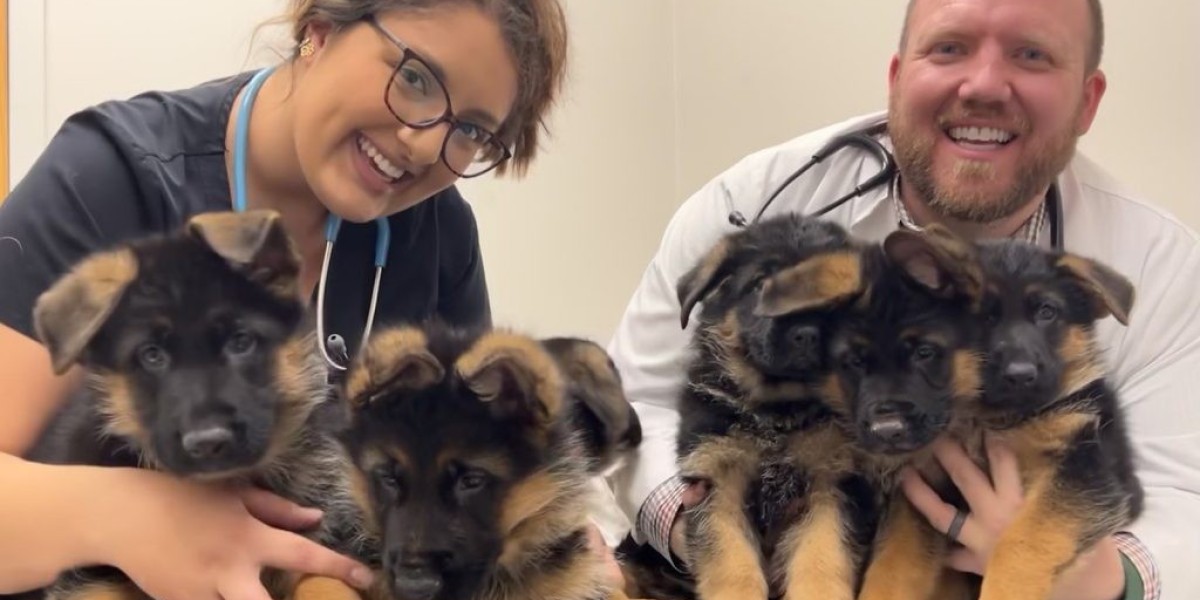Like many breeds, German Shepherd puppies require plenty of physical and mental activity. If not stimulated enough they could get bored and exhibit destructive behavior, like chewing or digging on your favorite shoe!
 Find a responsible dog breeder who is committed to producing dogs with a healthy temperament. Find a breeder that conducts health checks and is willing to provide you with pedigree details for each puppy.
Find a responsible dog breeder who is committed to producing dogs with a healthy temperament. Find a breeder that conducts health checks and is willing to provide you with pedigree details for each puppy.Health
German Shepherds must also have a balanced diet. They require a balanced diet of proteins, carbohydrates and fats, as well as vegetables and fruits. Carbohydrates, like those found in whole grains, legumes and veggies are a great source of energy that doesn't cause spikes and crashes. They also contain fiber, prebiotics and antioxidants. Proteins are essential for the development, repair, and maintenance of tissues in the body. They contain amino acids, the building blocks of all cells, as well as helping to regulate blood sugar levels. Fats are essential to regulate cholesterol levels and stopping inflammation.
German Shepherds, just like all dogs, are susceptible to arthritis and musculoskeletal disorders. These conditions can be avoided by ensuring that you feed a high-quality diet for your dog, staying clear of table scraps and people foods and also exercising your GSD in a safe place when on leash. Do not over-exert yourself with your dog; two hours of exercise each day is sufficient, particularly when a puppy.
Some German Shepherds are prone to a disease of the pancreas called exocrine pancreatic insufficiency. The Pancreas suffers from this condition, causing it to not produce the enzymes required to digest and absorb the dietary fat acids. While they are eating the food, dogs with this condition will suffer from starvation to the point of death. A lifelong diet of supplementation with digestive enzymes can be a powerful treatment.
German Shepherds are also susceptible to skin allergies and often develop allergic dermatitis as young as age one. This condition has similar symptoms to hay fever and causes swelling, itchy paws as well as the belly. Other areas, such as the ears or face can also develop itchy, flaky, dry skin. Our vets can prescribe medications to soothe your pet's itching and inflammation.
Elbow dysplasia is yet another common disorder that affects GSDs. This painful condition occurs when the elbow joints don't form correctly during puppyhood. We can recommend treatment with physiotherapy and weight control in mild cases or surgery to ease pain, swelling and stiffness when it gets more serious. GSDs can also be affected by parasites, such as fleas, ear mites and ticks. They may also have ringworms, hookworms or heartworms. Central Texas veterinary specialist can prescribe the appropriate medications to fight and treat parasites.
Training
German Shepherds love to learn and excel at obedience training. Enroll your German Shepherd in a puppy or puppy obedience class to teach them commands like "sit," "down," and "stay." A reputable trainer can help you establish loose leash walking.
Online videos can be an excellent source. Leerburg has an excellent collection of videos, and Hamilton Dog Training has a great video on loose leash training. Typically, one adult member of the family will be the main trainer. However, if you hire an experienced trainer to help train your puppy, it will make the process simpler for everyone in the family.
Potty training for your German Shepherd is vital. A German Shepherd should be aware that the potty is outside. Using potty pads can confuse them. If they are required to go out, you should watch for them to whine or paw at the front door. Once they have mastered this, they can walk along with you on a lead in the neighborhood, or go to pet stores or restaurants.
Social interaction is essential at this time. This is the time they make connections that will impact how they see the world for the rest of their lives. It is important for them to be accustomed to new sights and sounds, as well as smells.
The most typical behaviors you'll associate with German Shepherds include guarding, and being stimulated by movement (not in a negative way). It's not uncommon to see them attack or bark at an approaching car. This is their natural instinct.
Playing fetch with your German shepherd is a great way to socialize him. It's an excellent way to let loose the dog's natural desire to chase. This is an excellent idea to give them something to do even when you're not be there to play with them.
Exercise
German Shepherds have plenty of energy and thrive when they get regular exercise. Exercise keeps them healthy, fit and active, helping prevent boredom, frustration, and behavioral issues such as excessive barking or destructive chewing. It also lets them express their natural instincts, such as herding. Exercise can help your pup focus on you, and even reduce separation anxiety.
It is important not to overdo the physical activity for a German shepherd. The puppies of German Shepherds are growing and may suffer from joint and bone problems when they're subjected excessive force or vigorous exercise. You can tell if your dog is over-exercised by watching for signs of exhaustion such as panting or lagging behind. Take them on shorter walks or slower play sessions that aren't as intense, to give them time to recover.
Exercise can be provided through a variety of activities, like brisk walking or running or fetching, as well as agility training. These exercises also allow for socialization, which is essential to the mental health of your German Shepherd.
Going with your German Shepherd on hikes is another excellent way to get them out of their homes and into a new setting, which will help to burn off energy while strengthening the muscles. Swimming is a great way to build up your German Shepherd without putting stress on their joints.
You could also try dog sports like flyball or agility to give your German Shepherd an intense exercise that wears them out mentally and physically. Dog sports are also a great way to build a bond with your German Shepherd and can improve their obedience skills. Territorial aggression is a typical problem for German Shepherds however, exercising and training your dog regularly can help keep it under control. If you notice that your German Shepherd is growling or barking when he sees someone new, it could be a sign of territorial aggression. It is crucial to address it immediately. Talk to your veterinarian if you notice that your German Shepherd is exhibiting this behavior. He will be able to provide suggestions and tips on how to calm him down.
Care
German Shepherds are smart and loyal. Their protective instincts and devotion make them a great companion. Keeping them mentally and physically stimulated is key to their well-being. This can be accomplished through obedience training, Schutzhund competition, agility and other physical challenges. Regular walks and playtime is essential.
Due to their size, strength and athleticism, German Shepherds need plenty of exercise each day. If you're unable to provide them with this, then enlisting an experienced dog-walker in taking care of their needs will be an absolute necessity.
Taking care of your German Shepherd puppy starts with visiting the vet for their first health checkup. A veterinarian will evaluate your puppy's bone and spine development and discuss the best diet, supplements and exercises for your new member of the family.
Like all dogs, German Shepherds are able to be afflicted by a variety of health issues, such as elbow and hip dysplasia, reinrassiger deutscher schäferhund kaufen - Click At this website - degenerative myelopathy and degenerative spinal stenosis. Von Willebrand disease. These conditions are caused by environmental and genetic factors. Breeders who are responsible for screening for these conditions to stop them from being passed on to their pups.
In addition to these well-known health issues, German Shepherds can also be susceptible to bloat. Gastric dilatation volvulus (or GDV occurs when the stomach fills with gas and then twists on itself, cutting off blood flow to the organ. This can be life-threatening. The symptoms include drooling, vomiting (but no food comes up) swelling or distended abdomen, hunching, restlessness, and a labored breathing.
GDV can be prevented by a diet that does not contain a lot of fiber or a lot of carbohydrates. Incorporating digestive enzymes into the dog's diet could help. These are available in powder form and can be given to your dog every day as directed by your veterinarian. It is also recommended to give your dog a once a month bath. This will keep his coat looking fresh and reduce the amount of shed. It is also important to make sure there is a bowl of clean fresh water is available at all times for your German Shepherd. You can buy a dog-safe dish at a pet store or on the internet.








